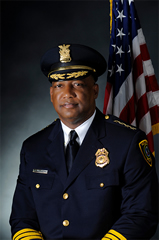
Houston Police Chief Charles A. McClelland Jr.
WASHINGTON — A group of more than 130 law enforcement officials have banded together with a pledge to reduce incarceration rates, in part through improved community relations.
And while they aren't focused on juvenile justice, some members of the group said the treatment of adolescents matters to their effort.
Leaders of the group said Wednesday at a press conference that law enforcement can help reduce a reliance on incarceration without threatening public safety.
Their message comes at a critical time for criminal justice, as federal lawmakers take a serious look at sentencing and other reforms.
“We have to be smart and we have to embrace this moment,” said Ronal Serpas, co-chair of the group and former superintendent of the New Orleans police department.
Young offenders also need proportionate consequences, said Benjamin David, district attorney for New Hanover and Pender counties in North Carolina, in an interview.
Too often youth end up dropping out of school or having trouble finding a job once they’ve encountered the justice system — increasing the likelihood of recidivism, he said.
 “We’ve got to take care of the little stuff, and with our children, the vast majority of it is,” he said. “What we’re saying is let’s not make it bigger than it needs to be. Because when you take them out of school or make them a felon or say you’ve committed a misdemeanor, they’re dropping out. They’re statistically on a totally different trajectory for the rest of their lives.”
“We’ve got to take care of the little stuff, and with our children, the vast majority of it is,” he said. “What we’re saying is let’s not make it bigger than it needs to be. Because when you take them out of school or make them a felon or say you’ve committed a misdemeanor, they’re dropping out. They’re statistically on a totally different trajectory for the rest of their lives.”
The group, Law Enforcement Leaders to Reduce Crime and Incarceration, is made up of former and current police chiefs, sheriffs and prosecutors from all 50 states.
Their policy priorities are to:
- increase alternatives to arrest and prosecution, especially diversion for mental health and drug treatment;
- reduce the severity of some laws by reclassifying some felonies to misdemeanors and removing criminal sanctions;
- reduce or eliminate mandatory minimums; and
- strengthen the relationship between law enforcement and communities.
Programs for juveniles can play a role in keeping adolescents from ever reaching the criminal justice system, several members of the group said.
Charles McClelland, chief of the Houston Police Department, pointed to a mentoring program in two Houston alternative high schools that seeks to build relationships between law enforcement and students who are at risk of entering the criminal justice system.
Keeping kids in school and out of trouble is key, he said. “It really becomes an effective crime prevention tool,” he said in an interview.
Lisa Pilnik, deputy executive director of the Coalition for Juvenile Justice, said it’s encouraging to hear law enforcement talk about reducing unnecessary incarceration. However, she cautioned that there’s no automatic “trickle down” effect of reform efforts in the adult system to the juvenile justice system.
“They are two different systems, and while there are many parallel challenges and solutions, all juvenile justice reform needs to be undertaken with the understanding that children are different,” she said in an e-mail.
Members of the group stressed they’re not backing away from making arrests, but said they want to arrest the right people for the right crimes.
“No one here is talking about going light on crime,” said Benjamin David.
The group is a project of the Brennan Center for Justice at the New York University School of Law.